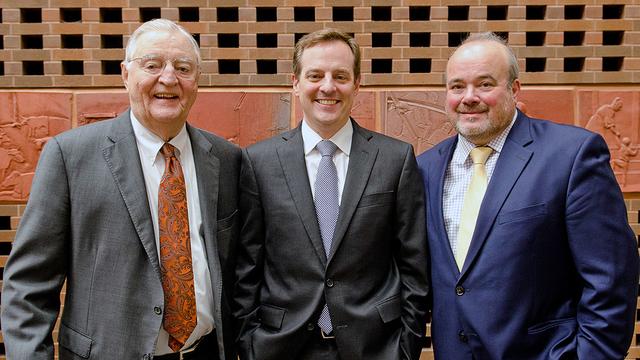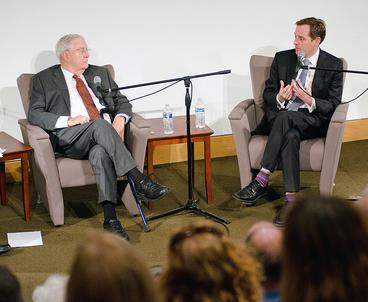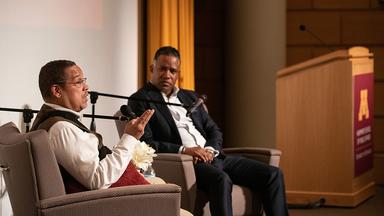How much power is too much for an American president to wield without congressional oversight? That question is on the minds of many political observers these days. It was also the subject of a lively discussion this week between former Vice President Walter Mondale and New York Times journalist Charlie Savage in front of a capacity crowd at the Humphrey School of Public Affairs.
Mondale and Savage, who writes and reports about national security and the expansion of presidential power, agreed that President Donald Trump is pushing the boundaries of his executive authority. But they also agreed that his predecessors, going back decades, all did the same thing.
The event was one in a new series called the Mondale Dialogues, launched this fall to promote the principles and values that have inspired Walter Mondale during his political career: transparency, accountability in government, opportunity and justice in the world.
“These are key issues that should inform all of us today, regardless of political party or affiliation,” Dean Laura Bloomberg said as she introduced Mondale. “They are about what it means to be an American in the world today, and what it means for us to navigate world affairs. They will, in fact, be dialogues.”
And that’s what it was—a fascinating dialogue highlighting Mondale’s distinguished political career as a U.S. senator and vice president and his presence in Washington DC during some of the nation’s most pivotal moments, and Savage’s 20-year career exploring the ongoing power struggles between the presidency and the Congress.
Secrecy and Reform in the 1970s
Mondale recalled his service in the mid-'70s on the U.S. Senate’s Church Committee, which investigated various secret intelligence operations by the CIA, the FBI, and other agencies—including attempting to assassinate foreign leaders, spying on Martin Luther King Jr., and monitoring the political activities of law-abiding American citizens.
“Our report shocked people, but also led to many reforms,” said Mondale. Among them was the passage of the Foreign Intelligence Surveillance Act (FISA) in 1978, which set up an approval process for surveillance of Americans and foreign nationals.
The reforms sought to restore the balance between personal freedoms and national security. But in the wake of the September 11, 2001 terrorist attacks, that balance has become skewed again, Savage said.
9/11 Changed Everything
“A lot of things we thought were settled have been reopened after 9/11— involving national security, civil liberties, and the rule of law,” Savage said, “and they remain open to this day.”
correspondent Charlie Savage at the inaugural Mondale
Dialogues event. Photo: Paula Keller
Since 9/11, under the umbrella of fighting terrorism, presidents have also ordered military actions without seeking congressional authorization.
Mondale said he is concerned about that trend, and reminded the audience that under the Constitution, Congress has the sole power to declare war except in cases of self defense.
“The Constitution provided for checks and balances over the use of executive power and war powers, and there’s a reason for that. Wars are nice things to start, but tough things to stop,” said Mondale. “I think our founders were very wise in dividing this power. We should not allow a generation of politicians to redefine the Constitution to suit their ends.”
Part of the problem is Congress itself, said Savage.
“Congress has written laws to delegate broad powers to presidents for national emergencies that are threats,” said Savage. “Current law doesn’t include any criteria setting out what an emergency or threat is. And presidents take advantage of that.”
Savage added that both political parties are hypocritical on the question of how much power presidents should have. “Their position shifts depending on which party controls the White House. That’s why it's so difficult to make change.”
Where Do We Go From Here?
In the end, both men said they think change will come. Savage said he sees “great interest in enacting new legal constraints” on presidential authority.
“Whether the next president is willing to sign into law constraints that would tie his or her own hands in response to what the current president and his predecessors have done remains to be seen,” said Savage. “I think the potential for that is there … but we’re on a journey where the destination is undetermined.”
Walter Mondale, with an even longer lens on political history, has a more positive outlook.
“I was there post-Watergate, and there was similar angst at that time. Watergate proves my point; the American people saw to it that those problems were corrected,” he said. “Is American democracy in retreat? I keep hearing these doomsday predictions ... but there’s every reason to be optimistic about it.”
About the Mondale Dialogues
The Mondale Dialogues, established in 2019, promote the decency and fairness that have guided the public life of former Vice President Walter F. Mondale and the principles he has long fought for: strengthened lawmaker accountability, expanded opportunity and justice, and deepened international connections. The series hosts nonpartisan public events throughout the year, featuring prominent national and international luminaries working on pressing issues of our time.



